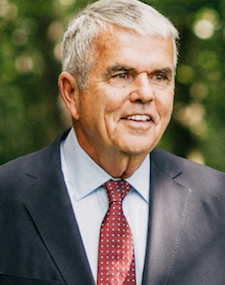By Don Keelan
Several years ago, a friend informed me that his daughter was not interested in attending college. “Why not have her join the Navy or another branch of the military?” I responded. His come-back was an absolute no; military service was far too dangerous. My next suggestion: why not law enforcement? No response.
I gather it depends on one’s perspective. Over the last several years, The U.S. military lost just under two dozen service personnel in America’s longest war, Afghanistan. On the other hand, according to an FBI report, in 2019, there were 106 deaths of law enforcement officers while the officer was on duty, and in 2020, 89. The number of injuries was in the thousands.

Don Keelan
On May 10, closer to home in Pittsford, a memorial ceremony was held at the Vermont Criminal Justice Training Academy. The annual event remembered and rendered respect to the 40 Vermont law enforcement officers who lost their lives in the line of duty in the past 213 years.
The Roll of Honor begins with Asa Marsh, who was killed in August 1808 and ends with Kyle D. Young, Vermont State Police, who died on September 17, 2015.
The police services represented on the Roll of Honor include the Vermont State Police, the U.S. Border Patrol, Sheriffs, local police departments, U.S. Customs, Vermont Fish and Wildlife, and the Vermont Department of Corrections. The Department of Corrections had the greatest loss of life — nine or just under 25%.
That the Vermont media gave this solemn memorial service little to no coverage is not surprising. From a news editor’s vantage point, coverage occurs where defunding the local police department is debated or where removing a police officer from school duty is critical news.
And let us not forget that tons of newsprint have covered how police agencies, at the state and local level and the Department of Corrections, are carrying out their responsibilities in a fair, objective, and bias-free manner. But, unfortunately, in frequent cases, there has been evidence that 100% professionalism is not always the case.
The fact is being a police officer, similar to serving in the military, can be a rewarding, albeit dangerous, career. Nationwide, this year alone, just through early May, over 120 officers have died in the line of duty, including over 64 from Covid-19. So much of this is lost on the people the police profession serves. And in large part, this is because serious misconduct by some police officers dominates the news.
There is a close comparison between what has transpired within the Roman Catholic Church and policing. Furthermore, it might be worthwhile for the police profession to learn from what has been a monumental tragedy within the Church.
The tragedy was that approximately 2% of Catholic priests abused children with whom they were entrusted over several decades. In addition, some leadership, not all, covered for the offending priests. At the same time, the rank-and-file members of the clergy stayed silent and did not insist that the offenders be expelled from the Institution.
Every state, city, and town needs its police. To think otherwise is unacceptable. It also needs a law enforcement profession with zero tolerance for conduct that heretofore was overlooked or, worse, accepted by the rank and file.
The fact that little was published in the media during the week set aside to honor fallen law enforcement officers needs to change. Furthermore, to really honor those in law enforcement who gave their lives, there must be true professionalism among those presently serving.
The Catholic Church has paid an awful price for what took place over the years. The law enforcement institution can learn from it.
And for those families of fallen law enforcement officers, let us note “Sacrificium Est Semper Memorabile.”
Don Keelan writes a bi-weekly column and lives in Arlington, Vermont.


